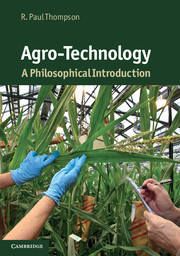Book contents
- Frontmatter
- Contents
- List of figures
- List of tables
- Preface
- Introduction
- 1 Scientific background
- 2 Application of genetics to agriculture
- 3 Philosophical and conceptual background
- 4 The controversy
- 5 The controversy
- 6 The controversy
- 7 The organic alternative
- 8 Impacts on low- and middle-income countries
- Concluding remarks
- Bibliography
- Index
Introduction
Published online by Cambridge University Press: 05 June 2012
- Frontmatter
- Contents
- List of figures
- List of tables
- Preface
- Introduction
- 1 Scientific background
- 2 Application of genetics to agriculture
- 3 Philosophical and conceptual background
- 4 The controversy
- 5 The controversy
- 6 The controversy
- 7 The organic alternative
- 8 Impacts on low- and middle-income countries
- Concluding remarks
- Bibliography
- Index
Summary
Food and water are essential to human life; more specifically, safe water in sufficient quantities, and safe and nutritionally balanced food in sufficient quantities are essential to good health. Until the twentieth century in developed countries (rich countries), neither could be taken for granted; for most of the world’s people today, neither can be taken for granted. People in rich countries, however, have for most of the last century had access to abundant, affordable and safe food and water. This is, incontestably, a direct function of advances in science and technology. Moreover, meeting the challenges of tomorrow will depend on continued advances. Jeffery D. Sachs eloquently makes this point in his book The End of Poverty:
I believe that the single most important reason why prosperity spread, and why it continues to spread, is the transmission of technologies and the ideas underlying them. Even more important than having specific resources in the ground, such as coal, was the ability to use modern science-based ideas to organize production. The beauty of ideas is that they can be used over and over again, without ever being depleted. Economists call ideas nonrival in the sense that one person’s use of an idea does not diminish the ability of others to use it as well. This is why we can envision a world in which everyone achieves prosperity. The essence of the first industrial revolution was not the coal; it was how to use the coal. Even more generally, it was about how to use a new form of energy. The lessons of coal eventually became the basis for many other energy systems as well, from hydropower, oil and gas, and nuclear power to new forms of renewable energy such as wind and solar power converted to electricity.
(Sachs, 2005, pp. 41–42)- Type
- Chapter
- Information
- Agro-TechnologyA Philosophical Introduction, pp. xiv - xxivPublisher: Cambridge University PressPrint publication year: 2011



